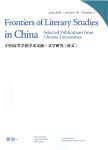Quiet Currents beneath the Torrents of Revolution: Everyday Life in Two Novels by Yan Geling
Quiet Currents beneath the Torrents of Revolution: Everyday Life in Two Novels by Yan Geling作者机构:Classical Middle Eastern and Asian Languages and Cultures Queens College The City University of New York Queen NY 11367-1597 USA
出 版 物:《Frontiers of Literary Studies in China-Selected Publications from Chinese Universities》 (中国高等学校学术文摘·文学研究(英文版))
年 卷 期:2014年第8卷第4期
页 面:617-630页
学科分类:0501[文学-中国语言文学] 0303[法学-社会学] 0502[文学-外国语言文学] 05[文学] 050106[文学-中国现当代文学] 08[工学] 0822[工学-轻工技术与工程]
主 题:Yan Geling habitus everyday life revolutionary China politicalsocialization human agency
摘 要:As a revolutionary leader, Mao Zedong had a new vision of China as a reformed revolutionary society. Challenging this radical social vision in The Ninth Widow (Di jiu ge guafu, 2006) and One Woman's Epic (Yige nuren de shishi, 2007), the contemporary Chinese writer Yan Geling describes how the characters retain their personal mentalities and habits in everyday life as they ignore, outmaneuver or even defy the political demands of revolutionary China. Focused on Yan's depiction of everyday life, the present paper offers a close reading and analysis of the two novels in relation to the theories of Pierre Bourdieu, Alf Ludtke and Michel de Certeau. It pays special attention to Yan's depiction of everyday life as a site where the characters in the novels bring their human agency into play as they satisfy their human needs and maintain their individual characteristics. Ultimately, it shows how Yan's depiction of everyday life questions the reach and efficacy of dominant ideology in revolutionary China.



